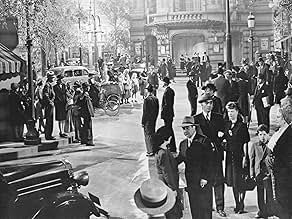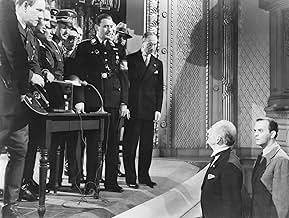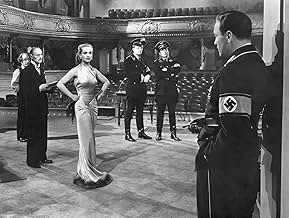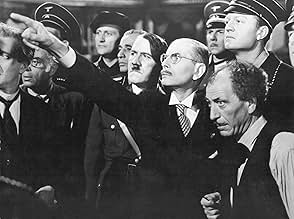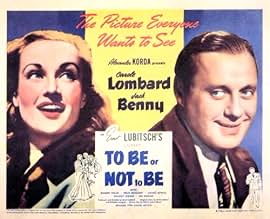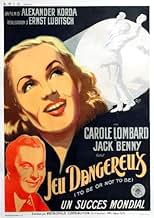Pendant l'occupation nazie de la Pologne, une troupe de comédiens se retrouve mêlée aux efforts d'un soldat polonais pour traquer un espion allemand.Pendant l'occupation nazie de la Pologne, une troupe de comédiens se retrouve mêlée aux efforts d'un soldat polonais pour traquer un espion allemand.Pendant l'occupation nazie de la Pologne, une troupe de comédiens se retrouve mêlée aux efforts d'un soldat polonais pour traquer un espion allemand.
- Nommé pour 1 oscar
- 2 victoires et 2 nominations au total
- Polish RAF Pilot
- (uncredited)
- German Soldier
- (uncredited)
Histoire
Le saviez-vous
- AnecdotesWhen Jack Benny's father went to see this movie, he was outraged at the sight of his son in a Nazi uniform in the first scene and even stormed out of the theater. Jack convinced his father that it was satire, and he agreed to sit through all of it. His father ended up loving the film so much he saw it forty-six times.
- GaffesAlthough having Maria Tura give the cue line "To be or not to be" to the men in the audience she wishes to meet in her dressing room is a very funny premise of the film, it actually would be highly impractical for Maria to think she would have time to meet backstage. Hamlet's "To be or not to be" soliloquy is only about 3-4 minutes long and Ophelia has the very next line in the play (in fact Hamlet announces her entrance at the end of his soliloquy), which would barely give Maria any time to meet men in her dressing room.
- Citations
Joseph Tura: [disguised as Professor Siletsky - speaking about Maria Tura] Her husband is that great, great Polish actor, Josef Tura. You've probably heard of him.
Colonel Ehrhardt: Oh, yes. As a matter of fact I saw him on the stage when I was in Warsaw once before the war.
Joseph Tura: Really?
Colonel Ehrhardt: What he did to Shakespeare we are now doing to Poland.
- Autres versionsIn Poland, a brief introduction was edited in. Polish actor Kazimierz Rudzki assured the audience that the movie was done with best intentions by their "American friends". At the time the movie screened in Poland, many people still lived in trauma from the events of World War II; few could find comedy in the German invasion of Poland, instead finding the movie in poor taste, offensive, or hard to swallow.
- ConnexionsFeatured in Showbiz Goes to War (1982)
- Bandes originalesPolonaise in A major, Op. 40, No. 1, 'Military'
(1838) (uncredited)
Written by Frédéric Chopin
Orchestral arrangement by Aleksandr Glazunov
Heard during the opening and closing credits
Lubitsch grew up in Berlin and became an acting sensation after World War I before becoming one of the most promising directors of Hollywood. A precocious talent with a sense of sophistication that would be known as the 'Lubitsch touch', he was probably under the influence of that boost of creativity and flamboyance that made Berlin an artistic Mecca in the early 30s (like in Bob Fosse's "Cabaret"). His film opens on Warsaw, a more suitable place for free art once Germany surrendered to swastikas. And as if he anticipated the criticism over his subject, the story features a play named "The Gestapo" and satirizing the Nazis. During a rehearsal, the man playing Hitler (Irish actor Tom Dugan) delivers a hilarious and unexpected "Heil myself". The line gets cut by the director who makes it a matter of ethics not to make Nazis funny, much to the actor's reluctance.
Basically, Lubitsch asks us the question: should we sacrifice a good line for the sake of seeming decency? How many times haven't we felt the necessity to cross the barrier of good taste because it was so tempting. So the line is censored because of the risk of offending Hitler and when the Germans come on a day of September 1939, the play is cancelled once and for all. The situation resonates like Churchill's parable about war and dishonour, fearing the Nazis is the dishonourable attitude, even when meant to play safe, you're never safe with them, so let's just use your best weapon, guns or gags it doesn't matter. While I was wondering if Lubitsch would have been as loose on the Nazis if he knew about the Camps, I was hiding a chuckle because the line "so they call me Concentration Camp Ehrhardt" kept springing to my mind. Should I feel guilty?
No less than for any movie that dared to turn the subject into laughing matter, from Donald Duck's "Der Fuerher's Face" to "La Vita e Bella". It's because Nazis were human that their crimes were horrific, it's because they were human that they should be mocked. Art is the triumph of the intellect over the brutal force, the sensitivity over cynicism, it can be sophisticated and fancy but it can't really do without powerful sentiments, this is why the film makes a good use of Shakespeare's lines (borrowed from "Hamlet" and "The Merchant of Venice") and even more why it focuses on a married couple, the greatest actress of Poland Maria Tura (Carole Lombard) and her hammy husband Joseph (Jack Benny). The film opens with a sort of vaudevillian mood where Maria exploits her husband's "Hamlet" soliloquy to bring the handsome aviator Sobinski (Robert Starck) to her room, the running gag is not overused so Marie doesn't appear too cheap and Joseph too dumb.
There's a fine balance between the romance and the screwball situations and they all get along with the intricacies of a plot that involves a sinister but seductive spy named Professor Siletski (Stanley Ridges), who proposes Maria to become an agent. Meanwhile, the troop must absolutely capture the man, confiscate the documents that contain names of Polish Resistant members and get rid of the spy, and this is where their Nazi costumes get quite handy. So we see Jack benny and all his friends impersonating Nazi officers and even Selitski with variable effects, sometimes with the right timing, sometimes a delay force them to rewrite the script. In a sort of meta-referential nod to his own art, Lubitsch directs actors playing directors, actors and writers, proving that sometimes a good act can be a matter of life and death. Hammy too much and your cover is blown if not your head. Maria proves to be a more restrained actress so she can dodge the Nazis' flair, same can't be said about Joseph and Benny's antics endanger the film's credibility in their exaggerated audacity, the man pushes his luck so often it's a wonder how he did survive.
The film also suffers from a series of contrivances that happen all too conveniently near the end leading to a rushed climax only redeemed by the hilarious ending. Still, the real black spot in the film's legacy is of course the haunting of Carole Lombard's memory. The actress died in a plane crash a few weeks after the film's release, the USA had just entered the war and she was collecting bonds during a tour across America. In a way, she was a victim of that war though she lived far from the ruins and ashes of Poland, her death cut one of the most promising careers short and made Gable so inconsolable he joined the war too... I avoided that film for a long time because of that story, it had saddened me a lot even more because I happen to be afraid of flying.
I couldn't believe how many times she referred to flights during the film, the simple fact that she loved an aviator gives it an eerie feeling, it's just as if the film was doomed to be clouded by tragedy, individual and universal. However, and that might be the secret of "To Be or Not to Be", It's all fiction, it's not reality, the film was criticized when the war was still raging and now it's a classic, once reality is as dead as fiction, what remains is the essence of art.as
- ElMaruecan82
- 24 juin 2019
- Lien permanent
Meilleurs choix
- How long is To Be or Not to Be?Propulsé par Alexa
Détails
Box-office
- Brut – États-Unis et Canada
- 3 270 000 $ US
- Brut – à l'échelle mondiale
- 4 578 000 $ US
- Durée1 heure 39 minutes
- Couleur
- Rapport de forme
- 1.37 : 1
Contribuer à cette page


